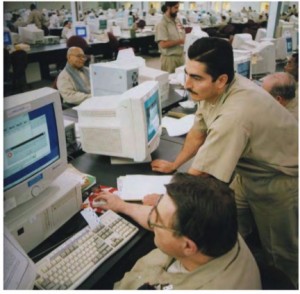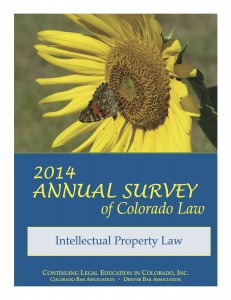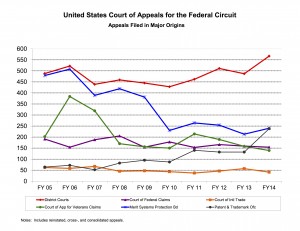According to C-Span (Link), Kara Stoll was confirmed today by the US Senate to be the newest member of the United States Court of Appeals for the Federal Circuit. Ninety-five members of the Senate voted “yea” and five did not vote.
Archive for the ‘Uncategorized’ Category
Kara Stoll Confirmed by US Senate
Tuesday, July 7th, 2015Colorado’s New Anti-Patent Troll Law
Saturday, June 27th, 2015If you were curious about Colorado’s new anti-patent troll law, the details are at this [Link].
Avoiding Recusal?
Tuesday, June 16th, 2015Whenever there is a rash of Rule 36 decisions, it seems as though an unanticipated en banc decision is soon to follow. Lately, the Federal Circuit has issued what seems like a large number of Rule 36 decisions — and, sure enough, today it issued an en banc decision in Williamson v. Citrix.
The cynic in me wonders if the reason that the court takes some cases en banc without oral argument is to avoid the opportunity for further amicus briefing that could cause recusal of some of its members. Both judges O’Malley and Moore are at risk of being gamed out of en banc decisions when their respective husbands’ firms are enlisted to submit amicus briefs. Once judicial candidate Stoll is confirmed by the Senate, a third judge will be at risk of recusal during en banc cases due to at least one close relative practicing in the patent field.
Perhaps the Federal Circuit should consider an internal rule to address this issue.
Chief Judge Prost Refers to New Practice as “A little troubling”
Wednesday, June 10th, 2015During the recent oral argument of In re Gross, Chief Judge Prost asked the associate solicitor about the Solicitor’s Office relatively new practice of adding a discussion of Alice v. CLS to appeals in which §101 was not addressed below by the PTAB. The associate solicitor noted that the discussion of Alice in this appeal was just being made to let the court know that the “[PTO] was familiar with the Alice issue”….? In addition to flagging the issue at the start of the PTO’s oral argument, Chief Judge Prost noted that the new practice was “a little troubling.” [Listen].
From what I could tell, Chief Judge Prost finds the practice a little troubling at least because the appellant only has an opportunity to respond to the §101 issue for the first time in the appellant’s reply brief.
I suppose there are other issues to consider as well. As a general rule, new issues are not supposed to be raised on appeal. Typically, it is the appellant that has a tendency to raise new issues. In this instance, it was the PTO in the role of appellee that raised a new issue not addressed below. There might be an exception for this case, however, because the Supreme Court decided Alice after the PTAB rendered its decision.
In addition, the Federal Circuit has noted that while 35 U.S.C. §101 is an issue of law, it can be informed by underlying or subsidiary factual issues. See Arrhythmia Research Technology v. Corazonix Corp., 958 F.2d 1053 (Fed. Cir. 1992) and In re Comiskey, 499 F.3d 1365, 1373 (Fed. Cir. 2007). So, raising the issue on appeal does not give the applicant any opportunity to present factual evidence with respect to those underlying or subsidiary factual issues.
The practice might be a little troubling to the PTAB and public, as well. The determination of patent eligibility by the PTO is really the province of the PTAB judges — more specifically it is the province of a majority of judges on at least a three judge panel. Each judge is required to meet specific qualifications (both legal and technical) and be sworn into office before making adjudications. When the Solicitor’s Office, i.e., the advocacy branch as opposed to the judicial branch of the PTO, asserts on behalf of the PTO for the first time that “Gross’ Claimed Invention Is Ineligible For Patent Protection Under The Supreme Court’s Recent Decision In Alice Corp. v. CLS Bank” — see page twenty-five of the USPTO brief — it appears to be invading the province of the PTAB.
You can’t fault the Solicitor’s Office for being zealous advocates. But, perhaps the CAFC will have more to say about this new practice in the future.
________________________________________________________________________________
As an aside, it is interesting to compare the Federal Circuit’s In re Comiskey opinion — in which the Federal Circuit sua sponte raised a §101 theory — with the Supreme Court’s opinions in Singleton v. Wulff, 428 U.S. 106, 120 (1976) and Hormel v. Helvering, 312 U.S. 552, 556-57 (1941):
It is the general rule, of course, that a federal appellate court does not consider an issue not passed upon below. In Hormel v. Helvering, 312 U. S. 552, 556 (1941),the Court explained that this is “essential in order that parties may have the opportunity to offer all the evidence they believe relevant to the issues . . . [and] in order that litigants may not be surprised on appeal by final decision there of issues upon which they have had no opportunity to introduce evidence.” We have no idea what evidence, if any, petitioner would, or could, offer in defense of this statute, but this is only because petitioner has had no opportunity to proffer such evidence. Moreover, even assuming that there is no such evidence, petitioner should have the opportunity to present whatever legal arguments he may have in defense of the statute. We think he was justified in not presenting those arguments to the Court of Appeals, and in assuming, rather, that he would at least be allowed to answer the complaint, should the Court of Appeals reinstate it.
Singleton v. Wulff, 428 U.S. 106, 120 (1976);
Ordinarily an appellate court does not give consideration to issues not raised below. For our procedural scheme contemplates that parties shall come to issue in the trial forum vested with authority to determine questions of fact. This is essential in order that parties may have the opportunity to offer all the evidence they believe relevant to the issues which the trial tribunal is alone competent to decide; it is equally essential in order that litigants may not be surprised on appeal by final decision there of issues upon which they have had no opportunity to introduce evidence. And the basic reasons which support this general principle applicable to trial courts make it equally desirable that parties should have an opportunity to offer evidence on the general issues involved in the less formal proceedings before administrative agencies entrusted with the responsibility of fact finding. Recognition of this general principle has caused this Court to say on a number of occasions that the reviewing court should pass by, without decision, questions which were not urged before the Board of Tax Appeals. But those cases do not announce an inflexible practice as indeed they could not without 557*557 doing violence to the statutes which give to Circuit Courts of Appeals reviewing decisions of the Board of Tax Appeals the power to modify, reverse or remand decisions not in accordance with law “as justice may require.” There may always be exceptional cases or particular circumstances which will prompt a reviewing or appellate court, where injustice might otherwise result, to consider questions of law which were neither pressed nor passed upon by the court or administrative agency below. See Blair v. Oesterlein Machine Co., 275 U.S. 220, 225.
Hormel v. Helvering, 312 U.S. 552, 556-57 (1941).
Don’t Miss It
Wednesday, June 3rd, 2015Michael Risch over at the Written Description blog has an interesting post today titled “Do Venture Capitalists Value Patents?” which covers Celia Lerman’s article “Patent Strategies of Technology Startups: An Empirical Study.” [Link]
Recording Telephone Conversations
Saturday, May 30th, 2015During a recent oral argument, Judge Wallach asked counsel about a recording that had been made of a telephone call without the other side’s consent. Apparently, the telephone call was presented as evidence at trial. As you may know, states take different positions on whether notice must be given to the other party of a telephone conversation when a recording is being made. Thirty-eight states are single-party-consent states, whereas twelve states are two-party-consent states. Judge Wallach emphasized that regardless of whether a state is a lenient single-party-consent state, that state’s bar opinions might take a stronger position. In such an instance, the state bar opinions trump the criminal statute for purposes of controlling conduct of lawyers within the state.
Here’s a link to a presentation on Colorado law that illustrates the issue in more detail: [Link].
USPTO Updates Patent Eligibility Guidance Web Page
Saturday, May 23rd, 2015The PTO has updated its Patent Eligibility Guidance page with Abstract Idea Workshop Materials for use with the previously published Abstract Idea Examples. Also provided is the USPTO’s case law summary. What appears below is from the PTO website [Link].
- Abstract Idea Workshop Materials (For use with the Abstract Idea Examples – January 27, 2015) (May 2015)NEW
- Blank Worksheet (Abstract Idea)
- Court Decision Chart Summary (Version 05/15/15) *This chart will be updated periodically with new judicial developments.
- Worksheet Example 1
- Worksheet Example 2
- Worksheet Example 3
- Worksheet Example 4
- Worksheet Example 5
- Worksheet Example 6
- Worksheet Example 7
- Worksheet Example 8
- Blank Worksheet (Generic Exception)
Prison Labor and Patent Publications
Tuesday, May 19th, 2015 Having been a registered patent attorney for over 20 years, I was surprised to learn the other day that prison labor is used as part of the USPTO’s printing process. I had never heard of that before.
Having been a registered patent attorney for over 20 years, I was surprised to learn the other day that prison labor is used as part of the USPTO’s printing process. I had never heard of that before.
Apparently since at least 1989, the PTO has outsourced some document proofing and printing operations to a contractor that then contracts with UNICOR — the Federal Prisons’ corporate entity that employs prisoners.
In a UNICOR report from 2009, the process is described as follows:
Fact
UNICOR has more than 35 years of experience supporting both military and civilian agencies and their contractors in data entry and document conversion. And contract awards can be made without the hassle of time-consuming competitive bidding.
The Challenge
Reed Technology and Information Services, Inc. (RTIS) was seeking a subcontractor counterpart that was passionate and reliable to meet the stringent requirements of the U.S. Patent and Trademark Office (USPTO) in support of its complex technical, high volume data needs, within the United States and abroad.
A Proven Performance History
UNICOR’s history of quality and timely performance in providing data conversion, pre-press composition, and searchable database creation services made UNICOR Data Services a sure investment. For more than 20 years, UNICOR has enjoyed a “win win” relationship with RTIS, effectively supporting the company by providing electronic information services such as data capture management and distribution tailored to the clients’ unique and time- sensitive specifications. RTIS specializes in the conversion of complex technical information, containing text, drawings, complex chemistry, mathematical formulas, statistics, and data tables, converting them into searchable formats, utilizing standard software conversion tools and RTIS’ proprietary applications.
A “Win Win” Solution
For almost 40 years, RTIS has consistently delivered to the USPTO high accuracy, high volume data conversion and handling, along with leading edge technical and process flow solutions that enable the USPTO to meet its statutory requirements for publishing patent applications and granting issued patents weekly. Confident that it would rise to the challenge, RTIS engaged UNICOR’s services without hesitation. Work performed under the subcontract includes data entry, data cleanup, verification, SGML-like tagging of all data, quality control, and return of patent information to RTIS.
Overwhelming Success!
UNICOR was RTIS’s “win-win” answer to fulfilling the stringent requirement from USPTO. Each week RTIS delivers over 160,000 pages of complex technical documentation to the USPTO with UNICOR’s support and expertise.
The process is complex. The USPTO contract details strict quality requirements and requires contractor flexibility to accommodate variations in the patent volume. RTIS forwards new patents for processing on a daily basis. The daily volume can range up to 35,000 pages a day. The work assigned must be completed within five days, regardless of volume surges. UNICOR cannot have more than 12.5 errors per 100,000 key strokes per category of patent, whether it is an abstract, text or a claim. UNICOR’s performance is measured on a weekly basis and according to RTIS, UNICOR has consistently out-performed the contractual requirements.
A Mutually-Rewarding Relationship
This longstanding relationship supports our respective missions and the services performed are highly adaptable to the federal inmate workforce. The exceptional work provided by the inmates, at cost-competitive rates, ultimately benefits the “bottom line” and reaffirms this trusted bond.
One prisoner blogged about the job at this link: [Link]. It was interesting to hear that a prisoner in the patent processing division works from 7:30-4:30 and can earn $300 a month, after several promotions. And, apparently, there is software that detects if the prisoner adds any profanity to a document.
Another blogger wrote about the process here: [Link].
I can’t help but wonder if Cool Hand Luke would have met with a better fate if he had worked as a patent formatter as opposed to tarring roads and clearing brush.
Did you stay up to date in 2014?
Thursday, May 14th, 2015Over the past few years, I have been writing the intellectual property chapter for the Colorado Bar Association’s book Annual Survey of Colorado Law. While the book focuses on Colorado law, the intellectual property chapter tends to be dominated by federal developments. This year’s publication is now available for download (for a nominal fee) in its entirety or by individual chapter from the CBA-CLE website: [Link].
Here’s a link to some of my other CBA-CLE materials: [Link].
Judge Sue Robinson Elected to American Law Institute
Wednesday, May 13th, 2015Judge Sue Robinson is one of the newest members of the American Law Institute, elected this past April. Judge Robinson is a US District Judge in the District of Delaware who carries a significant docket of patent cases.
As I look over the membership of the ALI and wonder if a Restatement of Patent Law could be far off — the ALI is currently drafting the first Restatement of Copyright Law — it occurs to me that the ALI ranks might benefit from additional new members with practical patent expertise. Some possible additions that come to mind are Judge Linn, Judge Moore, Dennis Crouch, Ted Sichelman, Donald Chisum, and Carl Moy.
Judges Bryson, Wallach, O’Malley, and Dyk are already members of the ALI.
Federal Circuit Ranks Lowest Among Circuit Courts in Regard to Judicial Complaints
Thursday, April 30th, 2015The U.S. Judiciary keeps track of complaints filed against federal judges. During the fiscal year that ended September 30, 2014, six judicial complaints were filed against judges under the administration of the Federal Circuit — the lowest number of complaints for any of the federal judicial circuits. [Chart].
Quote of the day
Monday, April 27th, 2015The Court has accordingly modified the standard by which lower courts examine allegedly ambiguous claims; we may now steer by the bright star of “reasonable certainty,” rather than the unreliable compass of “insoluble ambiguity.”
Judge Wallach writing for the Federal Circuit in Biosig Instruments, Inc. v. Nautilus, Inc., ___ F. 3d ___ (Fed. Cir. 2015) and contrasting the Supreme Court’s new standard with the Federal Circuit’s old standard for indefiniteness.
Ouch.
Appeals from the PTO to the Federal Circuit Up Significantly
Thursday, April 23rd, 2015The PTO statistics page shows the dramatic uptick in appeals to the Federal Circuit from the USPTO in recent years. In the last couple of years, the number of appeals from the PTO has more than doubled. There were 103 pending appeals from the PTO in February of 2013 compared to 231 in February of 2015. (Click on the chart for a higher resolution view)
The USPTO Solicitor’s Office has also grown. It now numbers 34 attorneys.
Oral argument of the week: Shinnecock Indian Nation v. U.S.
Thursday, April 16th, 2015I find the concept of “judicial takings” and patent law to be pretty interesting. I posted about this previously [here]. The Federal Circuit recently decided Shinnecock Indian Nation v. U.S. which is tangentially related to judicial takings, although not in the realm of patent law. During the oral argument, the Supreme Court’s plurality opinion from Stop the Beach Renourishment v. Florida Department of Environmental Protection, 560 U.S. ___ (2010) is discussed — although that opinion is ultimately not mentioned in the Shinnecock decision.
You can listen to the oral argument [here].
The opinion is available [here].
Judge Gilstrap Sitting by Designation
Wednesday, April 8th, 2015US District Judge Rodney Gilstrap of the Eastern District of Texas is sitting by designation with the Federal Circuit this month. This marks two months in a row that the Federal Circuit has hosted visiting judges.


